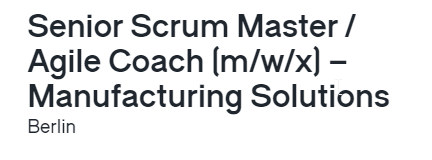When looking at job-ads, one sees ery often that the title of the ad is written like this
Agile Coach/Scrum Master

and in recent times, you can see a role, I#ve never heward before: Agile Master

This is not really correct and therefore I assume, that there is a misunderstanding about the roles. Let me explain the difference between the two roles.
An Agile Coach and a Scrum Master are both roles in agile work environments, but they have different responsibilities and areas of focus. Here are the main differences between an Agile Coach and a Scrum Master at different levels:
Focus and Responsibilities:
Agile Coach: the Agile Coach has a broader focus and is not limited to a specific agile methodology such as Scrum. The Agile Coach supports teams and organisations in understanding and implementing agile principles and values. They work at an organisational level and often support several teams in improving their agility.
Scrum Master: The Scrum Master focuses specifically on the implementation of the Scrum methodology. He is responsible for ensuring that the Scrum framework is applied correctly within the team. The Scrum Master helps to remove obstacles, promotes the self-organisation of the team and supports continuous improvement.
Understanding the role:
Agile Coach: The Agile Coach is a mentor and advisor for teams and managers. He works to promote an agile mindset throughout the organisation and helps to drive cultural change.
Scrum Master: The Scrum Master is more of a facilitator and service provider for the Scrum team. He works closely with the team to ensure that Scrum is implemented effectively and protects the team from external influences.
Scaling:
Agile coach: Agile coaches often work in large organisations and support the scaling of agile practices across multiple teams. They help to implement agile principles at company level.
Scrum Master: The Scrum Master focuses primarily on the dynamics and effectiveness of the Scrum team. In large organisations, however, it may be necessary for several Scrum Masters to work together and possibly be supported by an Agile Coach.
Time of intervention:
Agile Coach: the Agile Coach can intervene at different stages of the agile transformation, from the initial phase to the advanced implementation of agile practices.
Scrum Master: The Scrum Master is active throughout the development cycle of a project and works closely with the team to ensure that Scrum guidelines are adhered to.
Attitude and perspective:
Agile Coach: agile coaches often bring a broader range of skills and experience, including change management, leadership development and organisational development. They have a holistic view of the organisation and aim to promote an agile culture.
Scrum Master: Scrum Masters are more specifically focused on the implementation and optimisation of the Scrum framework. Their main role is to ensure that the Scrum team is working productively and removing impediments to ensure the delivery of high quality software.
Conclusion – Scrum Master vs. Agile Coach
In the world of agile teams, it is helpful to clearly understand the roles of Scrum Master and Agile Coach and their differences. The focus on individual teams versus more teams or possibly even the entire organisation is the key difference. For both, combine the principles of the Agile Manifesto and the Scrum Guide to drive a successful agile transformation.
An Agile Coach needs a lot of experience in Agility and it is best, when he has been working as a Scrum Master for several years,
